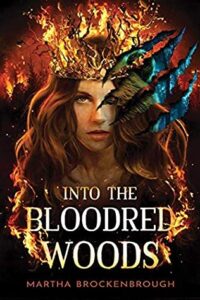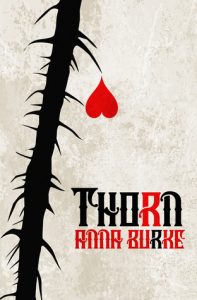Amazon Affiliate Link | Bookshop.org Affiliate Link
Trigger warnings: gore, torture, death, mutilation, sexual assault, child abuse, violence, harassment… and likely others I’m forgetting. This is a relentless work.
Imagine a story that understood the true horror of the old fairy tales, the depths of yearning and human pain that crafted them, and the wonder that lets us believe, and rolled them up into a young adult novel. Stuffed it with a cream of gorgeous prose. Sprinkled in some sapphic love here, a mature conflict about class distinctions there, a smattering of werefolk. Dusted liberally with feminism that permits physical strength to exist in equal validity.
Am I trying to describe a book or win Bake Off here? Who can tell!
Into the Bloodred Woods takes characters familiar to Western audiences and introduces them in a new telling that uses the strengths of that familiarity. For example, many books with this many perspectives have a confusing start—it’s hard to keep track of all the worldbuilding and four points of view. It’s easier here because I already knew their contexts. Hans and Greta, the woodcutter’s children, are familiar enough. Except this time, they’re left alone in the woods when illness claims their loving father and stepmother.
It uses those familiar characters to tell an original story. A summary of key events would only touch on a tiny fraction of the book itself. This is, as the back-cover blurb promises, a story about a king’s son and daughter, each of whom inherits half a kingdom, and the ensuing battles, politics, conniving, and cruelty. But all of that is shaped by characters: a prince who worships automation and pain, a well-intentioned but spoiled princess who thinks she’s clever enough, a child of the forest when the town is drawing near, and a woodcutter’s daughter who wants little more than family and safety. It’s the intermingling of those characters with the machinations of the wicked prince and his hoard of gold that can be melted by blood. There’s a lot going on, which leads to a fast-paced and multi-faceted story.
One criticism I’ve seen of this book centers on Ursula, daughter of the queen from Rumpelstiltskin’s story, who wants to be queen and has high ideals, but isn’t realistic or mature about them. I would argue that’s the point. She was raised on misogyny and fairytales. Of course she’s unprepared for the real world. It’s a flaw I liked, especially in the way it caused her to interact with Sabine, her love interest. Their love never felt easy. Sabine is of the oppressed werefolk, forced to live in a slum, sleep in a cage, and fight in a ring to earn her way. Though Ursula is also a were, she sleeps in a golden cage in a palace, and has limited understanding of the world and how power feels to the truly powerless. Love never handwaves their differences: they earn their closeness. Ursula has to grow and change, to do a lot of learning—some of it bitter and much of it alone. I liked the realism of that. Sabine didn’t excuse her mistakes. Distances between them feel honest, even as they both long for closeness.
This is an intense read. I wouldn’t recommend it without warning about that. It’s brutal, it’s relentless, and no one is ever truly safe. The primary villain, Albrecht, believes he understands the world better than anyone, that his rule is justified and his attention is a gift, and this justifies any act of violation. The woods themselves respond to the narrative by becoming dangerous and reactive. It’s a powerful story; it’s a story about power. It’s a story about survival, but it’s well worth the ache, as much for the catharsis as because Brockenbough doesn’t lose sight of what’s worth surviving for.
5 out of 5 stars, would be damaged by again!



